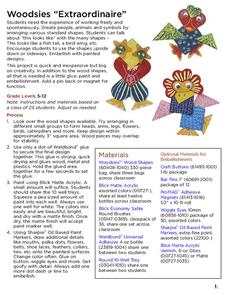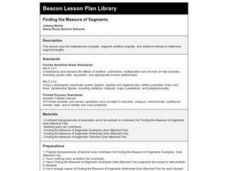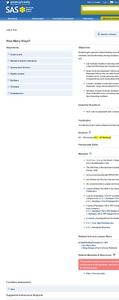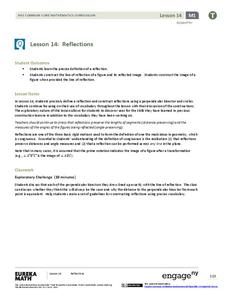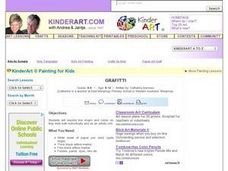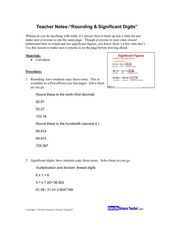Curated OER
Woodsies "Extraordinaire"
Allow your class to use their imaginations and create fun creatures with various wooden shapes and other embellishments. What a great way to encourage your young artists to stretch their minds!
University of Texas
What Are Calories?
What are calories, and how do calorie needs differ from person to person? Here is a worksheet that briefly explains how calories measure the energy supplied by food, as well as suggests the amount of food an individual should eat per day.
Curated OER
Modeling Basic Operations
Eighth graders engage in a lesson that investigates basic mathematical operations using a number line. They use props for hands on activities of visualizing the solution to a particular problem.
Curated OER
Notating a Rainy Day
Young singers learn how to notate the rhythms and melodies of a familiar song using Kodaly hand signals and manipulatives. Individuals then create their own compositions and sing them using Kodaly notation.
National Endowment for the Humanities
Lesson 1: In Depth with the Full Spectrum
High schoolers study the ways in which an artist can use color. They view various images of artwork and discuss the effect of color on spacial dimensions, focal points, tone, and mood.
Curated OER
A Method of Front-End Arithmetic
Teach the class how to add using front-end addition. They are given a shopping list and use it to practice adding from the largest place value to the smallest. Computational math and shopping, what fun!
Curated OER
Finding Sums to 6
Learners explore the additive identity property where they add multiple numbers to get to the number 6. In this number 6 lesson plan, students also work on their addition charts.
Curated OER
Finding the Measure of Segments
Young scholars observe and solve examples of betweenness, ruler postulate, and segment addition postulate. They complete the Finding the Measure of Segments worksheet using the distance formula.
Curated OER
2 digit subtraction
Second graders subtract numbers 0 through 10 from 2 digit numbers using different subtraction methods. In this subtraction lesson plan, 2nd graders practice crossing out numbers in a number line, using a 10, and using their fingers to...
Curated OER
Current Events Research
Students monitor current events using on-line and traditional resources. They explore issues such as what trends they see developing in specific news issues over time and how different news stories might be interrelated.
Curated OER
Fractions Continued
Students investigate the concept of using fractions to solve problems involving rational numbers. They order real numbers on the number line with the classification of fractions. Also students solve problems using the four operations...
Curated OER
How Many Ways?
Second graders develop number sense. In this number sense lesson, 2nd graders use multiple ways to represent numbers including written numerals, tally marks and manipulatives. Students correctly use place value to the thousands place.
Curated OER
Math Mammoth End of the Year Test - Grade 3
In this comprehensive diagnostic test worksheet, learners examine, study, calculate and solve 38 math problems. They work with a variety of basic math concepts and word problems.
Mathematics Vision Project
Module 6: Congruence, Construction, and Proof
Trace the links between a variety of math concepts in this far-reaching unit. Ideas that seem very different on the outset (like the distance formula and rigid transformations) come together in very natural and logical ways. This...
EngageNY
Complex Numbers and Transformations
Your learners combine their knowledge of real and imaginary numbers and matrices in an activity containing thirty lessons, two assessments (mid-module and end module), and their corresponding rubrics. Centered on complex numbers and...
Curated OER
How Many Raisins?
Students study the concept of addition. They create verbal number stories with numbers from one to five. They draw a slice of bread with a line down the middle and cut the bread shapes out of a "slice of bread" and a handful of raisins,...
EngageNY
Reflections
Facilitate creativity in your math class as individuals learn the definition of a geometric reflection and correctly construct a model, as well as its reflected image. They use a perpendicular bisector and circles to elaborate on...
PLS 3rd Learning
Priceless
The message that buying things brings happiness is everywhere. Teenagers are not immune to this marketing strategy and benefit from reflecting on the relentless pressure to spend. This exercise invites young adults to consider the value...
Hawaiʻi State Department of Education
Rhythm Patterns
Fractions can be tricky. Why not have kids think of fractions like they think of eighth, quarter, and half notes? In teams, the class creates four-measure patterns with their percussion instruments. They need to explain their rhythm...
Curated OER
Graffitti
Here is a fun way to encourage a cooperative classroom, drawing skills, and creative expression. Each child draws a design or shape on his paper, then he rotates to the next child's paper where he adds to the previous design. When the...
Curated OER
Rounding and Significant Digits
Practice rounding numbers to a certain decimal by solving in-class problems. Learners will solve several multiplication, division, addition, and subtraction problems while rounding to a specific decimal. They will also check their work...
Illustrative Mathematics
How Long
It won't take young mathematicians long to learn how to measure length with this fun, hands-on activity. Working in pairs, children use Unifix® or snap cubes to measure and record the lengths of different classroom objects. To extend the...
Curated OER
Save the Lofty Trees
Save the Lofty Trees, by Leslie Mills, provides the text for a study of the roles of animals and humans in the forest. Richly detailed, the plan offers two approaches to the play: as a scenario for children to imagine what actions would...
Curated OER
Design a Reef!
Using a miniature coral reef aquarium kit, young ecologists model this unique ecosystem. They research various coral reef organisms and their niches, and they culminate the project by working together to write a report. Use this activity...
